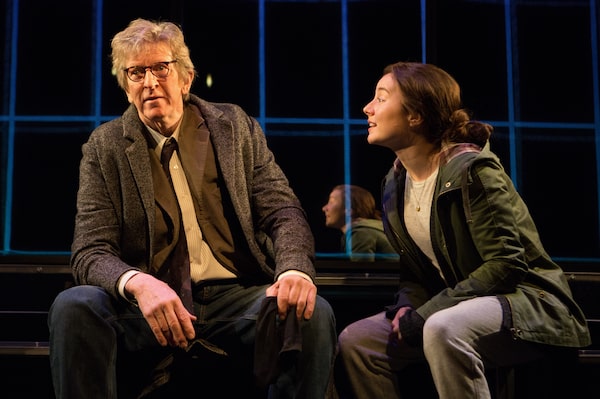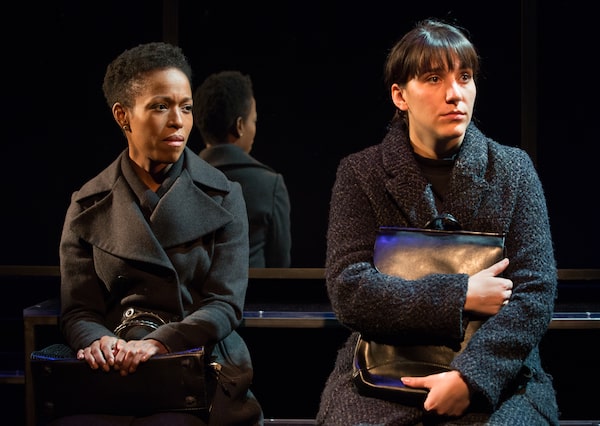
R.H. Thomson and Rachel VanDuzer in This Was the World at Tarragon Theatre.Cylla von Tiedemann
- Title: This Was the World
- Written by: Ellie Moon
- Director: Richard Rose
- Actors: R.H. Thomson, Rachel VanDuzer, Dakota Ray Hebert
- Company: Tarragon Theatre
- Venue: Tarragon Theatre Extra Space
- City: Toronto
- Year: To March 1
New plays seem to crop up every month about the culture wars on university campuses – with most of them, alas, little more than walking/talking op-eds. The woke ones can put you to sleep, while the free-speech satires are filled with straw-man snowflakes; both seem designed to keep a certain segment of the audience nodding.
By contrast, Ellie Moon’s This Was the World at the Tarragon Theatre pulls the rug out from under whatever you think the argument is on a regular basis. This sly – and often screwy – new play takes place in academia, but Moon seems to see what’s going on there as merely the latest manifestation of the age-old problem of generational transfer of power (see: King Lear).
It features, among other bizarre moments, a scene in which Canadian stage legend (and Anne with an E star) R.H. Thomson pulls his own jersey over his head and seems to fight himself while watching two hockey players get into a brawl on television. From my point of view, that alone is worth the price of admission.

Ellie Moon’s This Was the World at the Tarragon Theatre pulls the rug out from under whatever you think the argument is on a regular basis.Cylla von Tiedemann
Thomson stars as John Taylor, a white professor of Indigenous law at a small-town university who is illustrious, liberal and increasingly unsettled by the decolonization of his field (for which he has long theoretically advocated).
When we first meet him, John is having a meeting with a black associate dean named Terry (Kim Nelson) about an anonymous complaint she received about him from a student. “I did concede at the time, and I will now, that those remarks I made in class, the personal nature of them particularly, may not have been appropriate,” he says, saying what he thinks are all the right things to say in this sort of situation.
But while this meeting is being held to officially call him on the carpet, John – perhaps trying to regain his sense of power – pivots to using it to criticize one of his colleagues in private. He has serious objections to the recent hiring of Professor Winter, an Indigenous lawyer who used to be his student, and who he feels is not up to the job. (Moon, smartly, never lets the audience meet Professor Winter, just as she never lets us hear exactly what John said in class that was “inappropriate,” so the audience can project their own biases into these gaps.)
As Terry listens to John’s concerns, it becomes clear that she has had to listen to them many times before – and that his stubborn refusal to accept that he didn’t win this one argument, to relinquish a little bit of control, is now becoming a headache that she will have to do something about.

There’s a heightened aspect to all the performances in director Richard Rose’s production.Cylla von Tiedemann
Enter a first-year Indigenous student named Niimi (the deliciously dry Dakota Ray Hebert) – who ends up caught in the power struggle between the increasingly paranoid professor and the fed-up associate dean. Both John and Terry find ways to use their supposed concern for this young woman’s education and/or safety to battle one another. This is mostly quite amusing – until This Was the World takes a wild turn.
That turn involves John’s adult daughter, Ava (Rachel VanDuzer), who lives at home and works as a nanny. She has a lot of stage time herself, often hanging out with a friend named Tanya (Brittany Kay) who is also a student of John’s.
Suffering from an unspecified mental-health issue, Ava is both anxious about her outspoken father – she keeps searching for his name on Twitter to see if he’s about to be “cancelled” – and frustrated by his inability to talk about anything in a nonargumentative way at home as at work.
There’s a heightened aspect to all the performances in director Richard Rose’s production – and VanDuzer, in particular, goes out on a limb time and time again with big bold choices in her portrayal of Ava. It’s hard to always understand what is intended by this, however – when we are dealing with satire, when we’ve wandered into the expressionistic, and when we are simply witnessing some good old-fashioned scenery chewing.
As with her last play, What I Call Her, there’s a sort of untamed element to Moon’s writing that can be off-putting at times, but also creates some unforgettable scenes – such as the one where John jerseys himself.
That unusual moment is open to interpretation, but I saw it as an entertaining metaphor for white men who, having forgotten about the calls that went their way in the past, give in to their instinct to fight when one doesn’t go their way now, then howl and howl on the way to the penalty box.
Live your best. We have a daily Life & Arts newsletter, providing you with our latest stories on health, travel, food and culture. Sign up today.